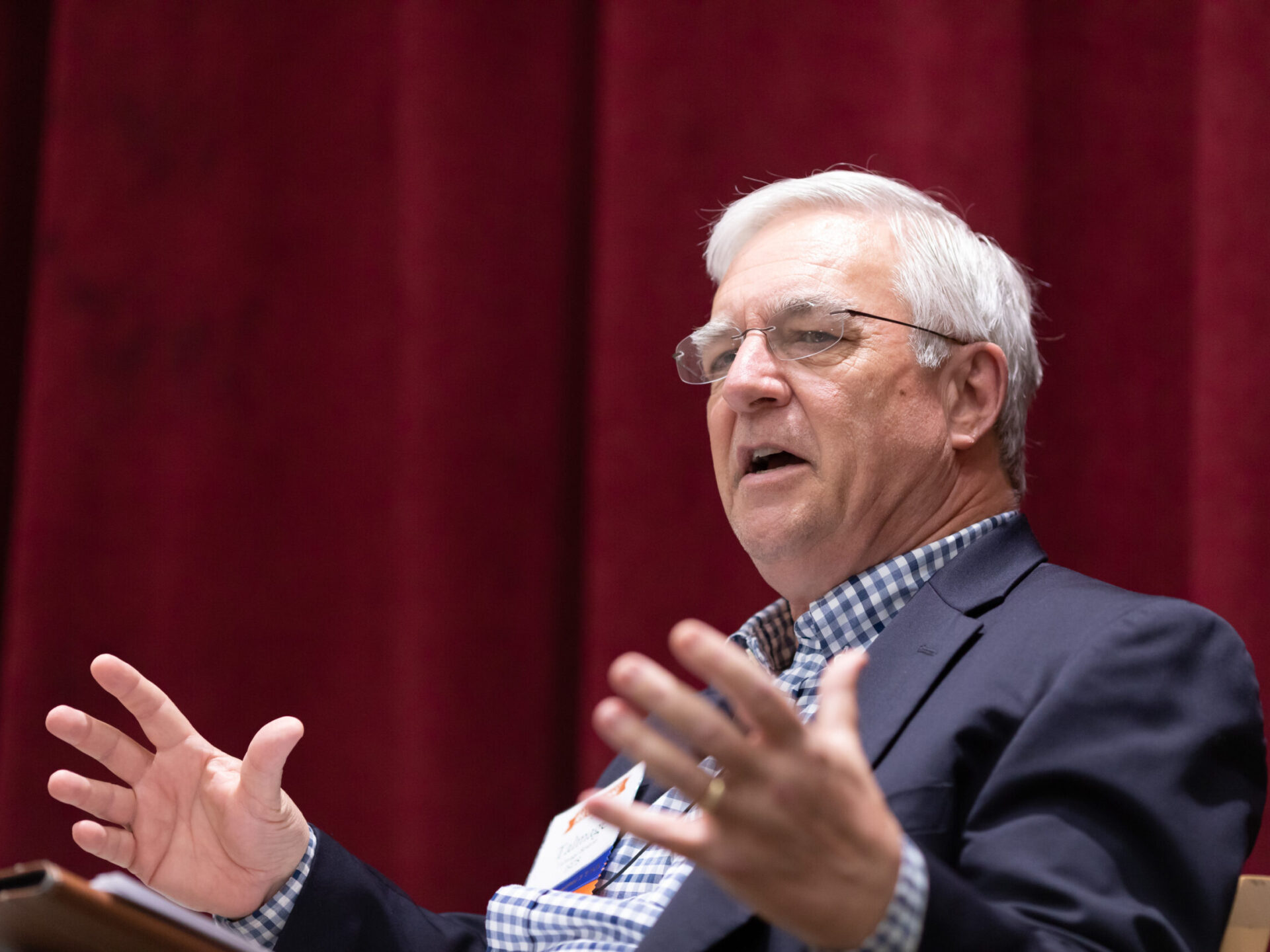
Over the last 47 years, Talmage Boston ’78 has deftly juggled not one, but two heady, high-profile careers. As one of Dallas’ top commercial litigators, he’s guided financial institutions, large landowners, and corporations to successful outcomes in major business disputes throughout Texas. He’s also an author whose work thus far has focused on the history of baseball, law, and America’s presidents.
Boston’s love for the law began at age 10, poring over a torts casebook belonging to his father who was attending night law school at the University of Houston. He liked how the law brought order to conflict. Since graduating from Texas Law, he’s litigated for clients ranging from Dallas Cowboys former owner “Bum” Bright to Fannie Mae to Bank of America. He’s won multimillion-dollar trials and arbitrations and his appellate work has been the subject of over 30 published opinions, including cases before the Texas Supreme Court and the U.S. Court of Appeals for the 5th Circuit.
While practicing law, Boston has authored five books endorsed by leading historians, including his most recent book, “How the Best Did It: Leadership Lessons from Our Top Presidents,” which was released in April 2024. He also hosts the “Cross Examining History” podcast and is a contributing columnist for The Dallas Morning News, usually opining on how presidential history applies to today’s presidential politics.
We recently caught up with Boston, who’s now started working on his next book about what made our greatest presidents tick and provided them with their moral compass. In 2025, he’s one of four distinguished Texas Law graduates selected by the law school’s Alumni Association to be recognized for their accomplishments in the legal profession.
You’ve spent nearly five decades practicing law, and are currently a partner at Shackelford, Bowen, McKinley & Norton LLP. What are some of your most memorable cases?
I’ve been board certified in both civil trial law and civil appellate law by the Texas Board of Legal Specialization for over 35 years, so I’ve always tried to maintain a good balance of trying cases and handling appeals. The variety of the suits I’ve handled over the years has kept things challenging and fun: in matters involving real estate, banking, oil and gas, and partnership disputes. My first three years as a lawyer, I worked as an associate at a firm in Dallas on matters involving the descendants of Texas tycoon H.L. Hunt, most notably the massive silver crash in the early 1980s. Later, I’ve represented oil companies, large landowners in condemnation lawsuits, all kinds of savings and loan and banking litigation, and title disputes over valuable properties. One of my most highly publicized cases was a lawsuit between Hunt family descendants Al Hill Jr. and Al Hill III, father against son, in which we got complete relief in the jury verdict as well as all of our attorney’s fees paid. Those kinds of victories are mountain-top experiences.
What do you enjoy most about the work, and how has that evolved?
I’ve always enjoyed being on my feet as an advocate in the courtroom, and at the appellate level, making oral arguments and writing the briefs. I also have liked solving problems for people that they can’t solve themselves. When pretrial mediation became popular in the late 1980s—and thank goodness it has stayed in place through today—I welcomed it as a means of getting cases settled before clients got to the courthouse steps on the day of the trial. A prudent businessperson and his litigator should understand that a trial should be the last resort for resolving disputes.
You’re also a passionate history writer. How did you get your start?
To read history is to be inspired by great things done by great people who have made the world a better place.
In college, I was a history minor at The University of Texas at Austin. It was a subject I loved and felt a calling to study. I started writing about history around 34 years ago in 1991. Although I had always enjoyed legal writing and worked hard to create a strong, tightly-edited legal written work product, too often after filing it, I’d go down to the courthouse for the hearing, and the judge would say, “What’s this case about?”—meaning he hadn’t read a word of my brief! So I decided to start writing for a larger audience. At the time, I was focused on baseball history, so my first published articles were on baseball history for a baseball creative publication called Elysian Fields Quarterly, and then my first two books were on baseball history.
What inspired your passion for the history of that sport?
I spent my grade school years in Houston. During the first half of the 1960s, big league baseball came to town with the arrival of the National League expansion team, the Houston Colt 45s, who in 1965 became the Houston Astros when the Astrodome opened. In those years, I had a great experience playing Little League Baseball in the Memorial area. Since I started reading voraciously at a young age and grew up with parents and grandparents who were always reading history, I soon recognized that the history of baseball and its statistics were better preserved than the history of every other sport. I proceeded to read every baseball history book in my grade school’s library and collected baseball cards, so my head was soon filled with facts about those involved on and off the field in our national pastime.
So, living in Dallas, that makes the Rangers your team, right?
As a 6-year-old in the summer of 1960, I saw a picture of Boston Red Sox superstar Ted Williams on the front page of the sports section in the Houston Post newspaper and thought, “How cool is it that a major league team is named after our family?” So ever since then, I’ve been a Red Sox fan, even though I’ve never lived in Boston. Since moving to Dallas in 1978 after law school graduation, over time, I’ve also become a fan of the Texas Rangers. When the Rangers play the Red Sox, I’m cheering for the Rangers, but when the Red Sox play anybody else, I’m cheering for the Red Sox.
Your book “Raising the Bar: The Crucial Role of the Lawyer in Society” looks at the profession’s importance. Why tackle that topic?
What led to my writing the book was in 2010, there was a general feeling in society that there were too many lawyers who lacked integrity and were doing more harm than good. So in an effort to turn that mindset around, I decided to write what I call “a lawyer inspirational book,” to remind people in and out of our profession that most lawyers do good things that keep our country on the right track. Texas Bar Books, which is connected with the State Bar of Texas, agreed to publish the book, and it has opened lots of doors for me in getting to speak at bar conventions all over the country.
Along with your other talents and interests, your real passion over the last few years has been presidential history. Which president do you admire most?
Being a historian has helped me become a better trial and appellate lawyer, and being a trial and appellate lawyer has helped me become a better historian—we do similar things.
Abraham Lincoln—he was a legal, literary, political, military, and theological genius—and you can’t say that about anyone else in history. He had only one year of formal schooling as a child, meaning he didn’t go to high school, college, or law school, yet because he was a voracious reader, he became our most eloquent president. In terms of his character, he always took the high road, never took the bait when people tried to set him off, forgave those who insulted him, stayed calm in a crisis, and always kept his promises. My book “How the Best Did It” discusses the 24 most important leadership traits demonstrated by our eight greatest presidents that led to their success, and Lincoln is the only one of the eight who had all 24 of the traits.
How do your two careers as an attorney and a historian complement each other?
Both jobs involve research, interviewing, analyzing, framing arguments, writing, editing, and persuading. Historians also have to constantly make presentations to audiences to promote our books—so lawyers and historians have to develop skills as public speakers. So I really use the same skill set in wearing both hats in my professional career.
It must be hard to find time for two professions. What’s your secret?
Two things make it possible. First, I don’t play golf, hunt, fish, or travel the world. Second, I’m truly an early-to-bed, early-to-rise person, which means I’m usually asleep by 8:30 p.m. and up at 4:00 a.m. That gives me three-and-a-half hours of total solitude in the morning for reading, researching, writing, and editing every day before I shower, shave, and put on my lawyer’s clothes and go to work on weekdays. On weekends, I have more hours to work on my writing projects.

How has Texas Law shaped who you are today?
I have 22 law school classmates who are among my best friends. We call ourselves the Canoe Brothers and got the name after we started going to Reid Wilson’s ’79 ranch near Boerne, Texas, every spring for a long weekend. We’d canoe on the Guadalupe River for a while, and then we’d eat, drink adult beverages, tell law school stories, and talk about our work and family. Now because of our age, we no longer canoe, but just float in inner tubes on the river, but the name stuck.
Academics-wise, during my time at UT Law School, I was fortunate to have Charles Alan Wright for Constitutional Law and Federal Courts. To learn from a legend like him is something I’ll never forget. I also enjoyed the hands-on experience I received in law school from moot court competitions and writing for the Legal Research Board. These activities readily transferred into the day-to-day practice of being a commercial litigator. I can’t imagine a richer environment for stimulation and professional growth than UT Law School.
Finally, as the school’s Outstanding Alumnus in 2025, how would you define an “outstanding” alum, and what does it mean to you to be honored by your fellow alumni and the law school?
An outstanding alum loves the law school, stays engaged with it, and offers his support to further its mission.
Receiving the honor this year is the greatest recognition of my life. There are thousands of Texas Law graduates who’ve done great things in the world and are worthy of recognition. So getting this award is truly a top of the mountain experience for me.
